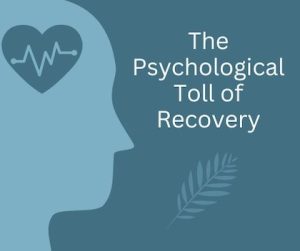The Psychological Toll of Recovery from Major Storms: Navigating the Emotional Aftermath of Hurricane Helene
October 7, 2024By Staff Reporter
Major storms like Hurricane Helene, can wreak havoc on communities, leaving behind not only physical destruction but also profound psychological effects on individuals and families. The aftermath of these storms can be a challenging time, filled with feelings of loss, anxiety, and uncertainty. Even minor damage and disruption can lead to emotional stress as individuals and families cope with the psychological toll of recovery. Understanding these effects is crucial for our community as we seek to heal and rebuild together.
Understanding the Psychological Impact
- Emotional Responses: Individuals may experience a range of emotions after a storm, including shock, anger, sadness, and fear. It’s normal to feel overwhelmed, especially if the storm has caused significant damage or loss of life.
- Trauma: For some, the experience of enduring a storm can lead to trauma, resulting in conditions like post-traumatic stress disorder (PTSD). Symptoms may include flashbacks, nightmares, and severe anxiety, which can persist long after the storm has passed.
- Community Stress: Communities often share the burden of recovery, leading to collective stress. The challenges of rebuilding infrastructure, restoring services, and addressing the needs of affected residents can strain community resources and relationships.
- Disruption of Routine: A major storm disrupts daily life, affecting work, school, and social interactions. The loss of familiar routines can exacerbate feelings of instability and anxiety.
Tips for Individual Recovery
- Acknowledge Your Feelings: Allow yourself to feel and express emotions. It’s important to recognize that grief, anger, and fear are valid responses to experiencing a disaster.
- Seek Support: Reach out to friends, family, or support groups. Sharing experiences and feelings can be therapeutic. Professional help, such as counseling or therapy, may also be beneficial for those struggling to cope.
- Establish Routines: Reestablishing daily routines can provide a sense of normalcy and stability. Create a daily schedule that includes work, self-care, and time for relaxation.
- Practice Self-Care: Engage in activities that promote well-being, such as exercise, meditation, or hobbies. Taking care of your physical health can positively impact your mental health.
- Limit Media Exposure: Constant exposure to news coverage of the storm and recovery efforts can heighten anxiety. Set boundaries on media consumption to protect your mental space.
Tips for Community Members to Support One Another
- Check-In Regularly: Make a habit of reaching out to neighbors and friends to see how they are coping. A simple phone call or text can remind someone that they are not alone and that others care.
- Listen Actively: Offer a listening ear to those who want to share their experiences or feelings. Sometimes, just being present and allowing others to express their emotions can be incredibly healing.
- Organize Support Groups: Consider organizing informal support gatherings where individuals can share their stories and feelings in a safe environment. This can help normalize the recovery process and foster community connections.
- Share Resources: If you know of local mental health resources or support services, share this information with others. Providing guidance on where to find help can make a significant difference for someone struggling to cope.
- Encourage Collective Activities: Plan community events, such as potlucks or clean-up days, to help people come together. Engaging in collective activities can strengthen bonds and provide opportunities for healing.
- Promote Acts of Kindness: Encourage small acts of kindness within the community, such as offering to help with errands, sharing food, or simply checking in on those who may need extra support. These gestures can have a profound impact on someone’s mental well-being.
- Create a Community Bulletin Board: Set up a physical or digital bulletin board where community members can post messages of support, share resources, or offer help. This fosters a sense of solidarity and connection.
Conclusion
It’s okay to not be okay. Recovering from a major storm is a complex process that involves addressing not only the physical destruction but also the emotional and psychological impacts on individuals and communities. By acknowledging the psychological toll and implementing strategies for support and healing, individuals can navigate the recovery journey more effectively, fostering a stronger, more resilient community in the aftermath of adversity.



















